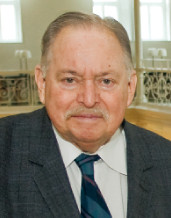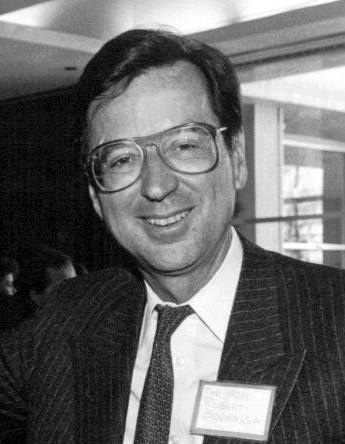|
Henri-François Gautrin
Henri-François Gautrin (born July 30, 1943 in Béthune, France) is a Quebec politician, professor and physicist. He was the Member of National Assembly of Quebec for the riding of Verdun in the Montreal region. He represented the Quebec Liberal Party and was the former Minister of Governmental Services from February 2006 to February 2007. Gautrin went to Collège Stanislas before going to the Université de Montréal where he obtained a bachelor's degree in sciences. He later obtained a master's degree in sciences at McGill University before heading to the Université de Dijon in France in 1971 where he received a State doctor's degree. He also studied economics and public finance in Paris. He was a professor in the mathematics department at the Université de Montréal since 1969. In addition to his teaching duties at that university, he was also an administration staff member and a member of the executive committee. He was also active in politics as the leader of the New D ... [...More Info...] [...Related Items...] OR: [Wikipedia] [Google] [Baidu] |
Béthune
Béthune ( ; archaic and ''Bethwyn'' historically in English) is a city in northern France, sub-prefecture of the Pas-de-Calais department. Geography Béthune is located in the former province of Artois. It is situated south-east of Calais, west of Lille, and north of Paris. Landmarks Béthune is a town rich in architectural heritage and history. It has, among other features, a large paved square with shops, cafés, and a (133 steps) belfry standing in the center from the top of which the Belgian border can be seen. The chime of the belfry is composed of thirty-six bells. A belfry (French:''"beffroi"'') has stood on the site since 1346. The current belfry plays melodies every 15 minutes, including the ch'ti (regional patois) children's lullaby "min p'tit quinquin" (my little darling). In 2005, the belfry was inscribed on the UNESCO World Heritage List as part of the Belfries of Belgium and France site, because of its architecture and testimony to the rise of municipal po ... [...More Info...] [...Related Items...] OR: [Wikipedia] [Google] [Baidu] |
Taillon
Taillon is a provincial electoral district in the Montérégie region of Quebec, Canada that elects members to the National Assembly of Quebec. It comprises part of the borough of Le Vieux-Longueuil of the city of Longueuil. It was created for the 1966 election from Verchères and Chambly electoral districts. It was named after former Quebec Premier Louis-Olivier Taillon who was in power for four days in 1886 and from 1892 to 1896. It is best known as the riding of Parti Québécois founder René Lévesque, who served as premier from 1976 to 1985. For the better part of four decades after the PQ seized it in 1976, Taillon was a stronghold for both the PQ and the sovereigntist cause. In the 1995 Quebec referendum it voted 61% for Quebec to separate. However, in 2018, the Coalition Avenir Québec narrowly won it amid its near-sweep of Montérégie. Members of the Legislative Assembly / National Assembly This riding has elected the following Members of the National Assembly ... [...More Info...] [...Related Items...] OR: [Wikipedia] [Google] [Baidu] |
Premier Of Quebec
The premier of Quebec ( French: ''premier ministre du Québec'' (masculine) or ''première ministre du Québec'' (feminine)) is the head of government of the Canadian province of Quebec. The current premier of Quebec is François Legault of the Coalition Avenir Québec, sworn in on October 18, 2018, following that year's election. Selection and qualifications The premier of Quebec is appointed as president of the Executive Council by the Lieutenant Governor of Quebec, the viceregal representative of the Queen in Right of Quebec. The premier is most usually the head of the party winning the most seats in the National Assembly of Quebec and is normally a sitting member of the National Assembly. An exception to this rule occurs when the winning party's leader fails to win a riding. In that case, the premier would have to attain a seat by winning a by-election. This has happened, for example, to Robert Bourassa in 1985. The role of the premier of Quebec is to set the legislati ... [...More Info...] [...Related Items...] OR: [Wikipedia] [Google] [Baidu] |
2003 Quebec General Election
The 2003 Quebec general election was held on April 14, 2003, to elect members of the National Assembly of Quebec (Canada). The Parti libéral du Québec (PLQ), led by Jean Charest, defeated the incumbent Parti Québécois, led by Premier Bernard Landry. In Champlain there was a tie between PQ candidate Noëlla Champagne and Liberal candidate Pierre-A. Brouillette; although the initial tally was 11,867 to 11,859, a judicial recount produced a tally of 11,852 each. A new election was held on May 20 and was won by Champagne by a margin of 642 votes. Unfolding In January 2001, Lucien Bouchard announced that he would resign from public life, citing that the results of his work were not very convincing. In March 2001, the Parti Québécois selected Bernard Landry as leader by acclamation, thus becoming premier of Quebec. In 2002, the Parti Québécois (PQ) government had been in power for two mandates. It was seen as worn-out by some, and its poll numbers fell sharply. It placed th ... [...More Info...] [...Related Items...] OR: [Wikipedia] [Google] [Baidu] |
1998 Quebec General Election
The 1998 Quebec general election was held on November 30, 1998, to elect members of the National Assembly of the Province of Quebec, Canada. The incumbent Parti Québécois, led by Premier Lucien Bouchard, won re-election, defeating the Quebec Liberal Party, led by Jean Charest. After the narrow defeat of the PQ's proposal for political independence for Quebec in an economic union with the rest of Canada in the 1995 Quebec referendum, PQ leader Jacques Parizeau resigned. In January 1996, Bouchard left federal politics, where he was leader of the Bloc Québécois in the House of Commons of Canada, to lead the Parti Québécois and become premier. Jean Charest had also left federal politics, where he had been leader of the Progressive Conservative Party of Canada. Charest was initially seen as a bad fit for the Quebec Liberal Party, and for provincial politics. He later overcame this perception. In terms of the number of seats won by each of the two parties, the result was almost ... [...More Info...] [...Related Items...] OR: [Wikipedia] [Google] [Baidu] |
1994 Quebec General Election
The 1994 Quebec general election was held on September 12, 1994, to elect members of the National Assembly of Quebec. The Parti Québécois, led by Jacques Parizeau, defeated the incumbent Quebec Liberal Party, led by Premier Daniel Johnson Jr. Johnson had succeeded Robert Bourassa as Liberal leader and Premier. Both his father, Daniel Sr., and brother, Pierre-Marc, had previously served as premiers of Quebec as leaders of different parties. The election set the stage for the 1995 Quebec referendum on independence for Quebec from Canada. The referendum would see the PQ government's proposals for sovereignty very narrowly defeated. Mario Dumont, a former president of the Liberal party's youth wing, and then leader of the newly formed Action démocratique du Québec, won his own seat, but no other members of his party were elected. In Saint-Jean, there was a tie between incumbent Liberal candidate Michel Charbonneau and PQ candidate Roger Paquin. A new election was held on ... [...More Info...] [...Related Items...] OR: [Wikipedia] [Google] [Baidu] |
Parti Québécois
The Parti Québécois (; ; PQ) is a sovereignist and social democratic provincial political party in Quebec, Canada. The PQ advocates national sovereignty for Quebec involving independence of the province of Quebec from Canada and establishing a sovereign state. The PQ has also promoted the possibility of maintaining a loose political and economic sovereignty-association between Quebec and Canada. The party traditionally has support from the labour movement, but unlike most other social democratic parties, its ties with organized labour are informal. Members and supporters of the PQ are nicknamed ''péquistes'' (), a French word derived from the pronunciation of the party's initials in Quebec French. The party is an associate member of COPPPAL. The party has strong informal ties to the Bloc Québécois (BQ, whose members are known as "Bloquistes"), the federal party that has also advocated for the secession of Quebec from Canada, but the two are not linked organizationally. A ... [...More Info...] [...Related Items...] OR: [Wikipedia] [Google] [Baidu] |
Minister (government)
A minister is a politician who heads a ministry, making and implementing decisions on policies in conjunction with the other ministers. In some jurisdictions the head of government is also a minister and is designated the ‘prime minister’, ‘premier’, ‘chief minister’, ‘chancellor’ or other title. In Commonwealth realm jurisdictions which use the Westminster system of government, ministers are usually required to be members of one of the houses of Parliament or legislature, and are usually from the political party that controls a majority in the lower house of the legislature. In other jurisdictions—such as Belgium, Mexico, Netherlands, Philippines, Slovenia, and Nigeria—the holder of a cabinet-level post or other government official is not permitted to be a member of the legislature. Depending on the administrative arrangements in each jurisdiction, ministers are usually heads of a government department and members of the government's ministry, cabinet and p ... [...More Info...] [...Related Items...] OR: [Wikipedia] [Google] [Baidu] |
1989 Quebec General Election
The 1989 Quebec general election was held on September 25, 1989, to elect members of the National Assembly of the Province of Quebec, Canada. The incumbent Quebec Liberal Party, led by Premier Robert Bourassa, won re-election, defeating the Parti Québécois, led by Jacques Parizeau. This election was notable for the arrival of the Equality Party, which advocated English-speaking minority rights. It won four seats, but never had any success in any subsequent election. Results The overall results were: See also * List of Quebec premiers * Politics of Quebec * Timeline of Quebec history * 34th National Assembly of Quebec The 34th National Assembly of Quebec was the provincial legislature in Quebec, Canada that was elected in the 1989 Quebec general election and sat from November 28, 1989, to March 18, 1992; from March 19, 1992, to March 10, 1994; and from March 17, ... External links CBC TV video clipResults by party (total votes and seats won)Results for all ridings Ref ... [...More Info...] [...Related Items...] OR: [Wikipedia] [Google] [Baidu] |
Verdun, Quebec
Verdun (; , ) is a borough (''arrondissement'') of the city of Montreal, Quebec, located in the southwestern part of the island. Long known as a working class neighbourhood, it has experienced significant gentrification and social change in the 21st century. Etymology The borough's name is a shortening of Saverdun, in France, the hometown of its early settler Zacharie Dupuy. It is not derived from the Battle of Verdun in World War I, predating the battle by centuries. History Early History There is archaeological evidence of indigenous peoples in the area as early as 5,500 years ago. A portage along what is now the boulevard LaSalle was used to pass the Lachine Rapids. A trading post was established at nearby Fort Ville-Marie in 1611 and colonization of the Island of Montreal began in 1642. In 1664 the Île-Saint-Paul (now Nun's Island) became a seigneury. The first colonial settlers were militiamen granted concessions in 1665 in exchange for defence against the Iroquois. ... [...More Info...] [...Related Items...] OR: [Wikipedia] [Google] [Baidu] |
.jpg)
.png)




